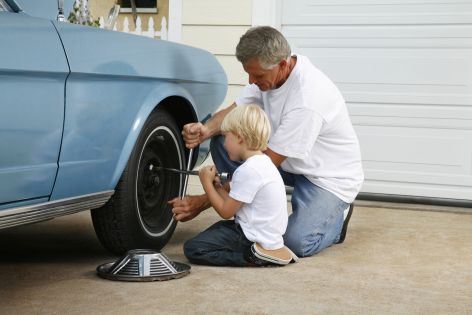.
What My Grandfather Taught Me About Being a Father
 “My grandfather was a major influence in my life and impacted what kind of father I became years later. Here’s what I learned from him.
“My grandfather was a major influence in my life and impacted what kind of father I became years later. Here’s what I learned from him.
More than 30 years ago, our oldest child was born. When this precious little miracle came into our lives, frankly, I was scared to death. I had not been around many babies in my life, so I knew basically nothing about them, and the idea of being responsible for a new little life was overwhelming!
Not only was I quite nervous about holding our baby and way out of my depth when it came to changing a diaper, I was even more unprepared for the lifelong task of being a father! But life doesn’t wait until we feel ready for challenges. Eventually, more children came, and with time and experience, the job became much less daunting.
As a boy growing up, the most stable and beloved man in my life was my maternal grandfather. I spent a lot of time on his farm and even lived there for part of my childhood.
Even though he died several years before I met my wife, the strength and example of this wonderful man taught me a lot about being a dad—not just from things he said, but from how he lived his life.
I’d like to share some of those lessons in this blog post.
Lesson 1: Strength
Grandpa was physically strong. As a teen working with him shoveling corn in a granary, I was certain I could outwork my grandpa, who seemed like an old man.
The strength and example of this wonderful man taught me a lot about being a dad—not just from things he said, but from how he lived his life.
So, I started shoveling faster and harder to prove my point. But it wasn’t long until I was sweating, dirty, worn-out and falling further behind! It was amazing how strong that “old” man really was!
But even more impressive than his physical strength was his strength of character. As a preteen, he had broken his back severely in an accident, but he never let it slow him down. He was mentally and emotionally tough—enduring several hard times throughout his life, including the death of a baby.
And, most importantly, he was spiritually tough—remaining faithful to God to the day he died.
Lesson 2: Patience
My grandpa consistently demonstrated untiring patience, no matter the circumstances. That trait was something he taught me when working with livestock.
There are times to yell and holler to stop the animals or herd them in a certain direction, but he also knew when patience, using slower movements and a calm voice, would work much better.
While working on farm equipment (and on a farm something always needs to be repaired or maintained), I’d sometimes get frustrated and growl at a “stupid wrench” or “stupid bolt.” Grandpa would remind me that the wrench and bolt were neither stupid nor smart, but that I was the one who had the option to be one or the other. Then he’d calmly examine my predicament and teach me a better way to get the job done.
His approach to people was similar. He was patient and able to put people at ease. He always took the time to listen and help people if he could.
Lesson 3: Reliability
There was never a question in my mind whether Grandpa would be there when I needed him. An example I’ll never forget was with my first car, a rather homely 11-year-old 1967 Plymouth.
 One day, on my way home from work, a back tire blew on my car. Grandpa had taught me how to change a tire, so I jacked up the car and went to work. But the lug nut didn’t want to come off. I figured I would put all my strength into it, but the entire lug bolt twisted off, nut and all! Then I tried another, and got the same result. With only three left, I was in trouble! I walked to the nearest farmhouse to use the phone and called Grandpa.
One day, on my way home from work, a back tire blew on my car. Grandpa had taught me how to change a tire, so I jacked up the car and went to work. But the lug nut didn’t want to come off. I figured I would put all my strength into it, but the entire lug bolt twisted off, nut and all! Then I tried another, and got the same result. With only three left, I was in trouble! I walked to the nearest farmhouse to use the phone and called Grandpa.
To my great relief, he pulled up a short time later. He stood and looked at the car for what seemed like a solid minute, then discovered an easy solution for properly removing the remaining bolts.
He was always there for me, and I knew it!
And he wasn’t there just for me. I saw Grandpa stop whatever he was doing when a neighbor came by to ask for help. If a church member needed help, Grandpa would drive two or three hours round-trip to help them. It’s just who he was.
Lesson 4: Integrity
My grandpa was a man of his word. He was always careful about making promises, but once he promised, it was as good as done. Whether it was a promise to help a neighbor, rototill Grandma’s garden or take me fishing—if he said it, he would do it.
I remember a day Grandpa promised to take me fishing as soon as he was done working on the truck. I remember standing near him with my pole, itching to go. Finally, with a sigh, he got up, wiped the grease from his hands, and we went fishing!
As much as he needed to finish the truck, he made good on his promise.
He had integrity, and he expected it from others, too, including me. That was a powerful lesson and example that has continued to impact my life.
The characteristics I learned from my grandfather—strength, patience, reliability and integrity—are all vital for a father to be a good example to his children and grandchildren. As we come to Father’s Day this year, I hope fathers and future fathers can learn from his example—just as I did.” From: https://lifehopeandtruth.com/life/blog/what-my-grandfather-taught-me-about-being-a-father/?
________
What Do You Cherish?
Cherish is a word we don’t hear very much anymore, except perhaps in wedding ceremonies.
Dictionaries tell us it means to hold dear, treat with tenderness, to nurture or cultivate with care and affection.
To gain a picture of what it really means, consider two scenarios:
A man with a very large yard begins to have problems with his old and well-used riding lawn mower.
The mechanic determines the engine needs to be replaced, but a new engine would cost more than the mower is worth, especially considering that the transmission and all the pulleys, bearings and other moving parts are already well worn from years of use. So the man decides not to repair the old machine, but to sell it for parts and purchase a new or newer used lawn mower. His decision makes sense.
Another man’s son has a terrible accident on his bicycle, shattering his right arm and elbow.
The doctor determines surgery is needed to take out bone chips, install a metal rod to strengthen the shattered bone, and this will be followed by months of therapy to ensure the child will eventually regain the full use and range of motion of his arm. Without giving more than a passing thought to the thousands of dollars this is going to cost, and the time and effort the entire family will put into helping the boy recover, the father immediately agrees to the surgery. Once again, his decision makes sense.
These two scenarios illustrate what we cherish.
To the man with the riding lawn mower, it was just a tool that he needed to care for his large yard, and it had served well for a number of years.
However, it had reached the end of its useful life, and the man did not cherish it enough to spend all that would have been necessary to bring it to a reasonable working condition. It was easier, faster and, in the long run, perhaps even less expensive to discard the old one and purchase a new one.
The son, of course, was cherished deeply. The father would work as long as needed—years perhaps—to make sure his son had the medical care he needed. His family would tenderly nurture and encourage the boy through the surgeries and rehabilitation until he regained strength and use of his arm. They would willingly invest whatever is necessary for the long-term welfare of the boy.
The world around us far too often treats relationships like the lawn mower rather than the boy.
If a relationship (marriage, family or friendship) is damaged or at a difficult place, it may seem easier to discard the old one and move on. We know relationships can’t be fixed by simply buying and installing a new part—much as we might wish it would be that easy! Relationships have to be healed, nurtured and cared for. And that takes a lot of time and effort. It often involves us admitting some fault as well, which is painful. So instead, far too many people divorce, quit speaking to each other, ignore each other and seek to find someone else.
The sad reality is that some relationships can’t be repaired, and in some cases, perhaps, should not be. And relationships are also different in that the lawn mower doesn’t put any effort into getting itself fixed. Relationships, on the other hand, can rarely if ever be healed without everyone involved putting forth the effort.
It comes down to a matter of what we cherish.
Let me combine this thought with something I read a while back:
In many homes (including my own), the refrigerator has magnets holding up crayon drawings, a report card or a photograph. We put them where we can see them every day because they remind us of the child/grandchild/friend who drew that picture, earned that grade or posed for that photo. It is special because in that sense it reminds us of the one who created it. How we respond to a picture reflects how we feel about the one who drew it or posed for it.
Bringing this back to relationships, how we treat another human being created in God’s image in many ways reflects how we feel about the Creator. If we cherish the truth we have, the calling we’ve been given, and the God who loves us so much that He gave His only Son to die in our stead, then let’s be sure we consider how we cherish the relationships we have in our lives. And let’s be willing to spend the time and effort required to keep them strong, or to heal them.
Here are some additional resources that can help you build stronger relationships:
- Seven Keys to Better Relationships
- The 5 Rs of Healing Relationships (Recognize, Repent, Replace, Reconcile & Retry)
Kind regards, and have a great rest of your week, Tom Clark, for Life, Hope and Truth”
________
Can Reflux in Babies Be Treated with Diet?

Can we treat the cause of infant reflux with maternal milk elimination?
There has been a longstanding problem among zookeepers: The gorillas were throwing up all of the time. “The practice of regurgitation has never been reported in wild Gorillas but it has unfortunately been accepted as normal by many keepers of captive animals.” What were they feeding them? Gorillas are big, strong animals, so they made sure to feed them a lot of protein—cottage cheese, meat, eggs, and milk—until a zoo in Germany got the radical idea of feeding them their natural diet of “leaves and vegetables.” And, the “change…following the alterations to the diet was astonishing.” Before the change, a silverback had been regurgitating and vomiting during most of the day. But, by the third day of eating what they were supposed to eat, he and the rest of the troop were miraculously cured.
Even just removing milk from the diets of the captive gorillas led to significant improvements. Cow’s milk was “historically considered an essential item in the captive gorilla diet,” but researchers showed that eliminating it may reduce such “undesirable behaviors…and may be a step toward better approximating the natural diet for captive gorillas.” The zookeepers were giving them animal milk after weaning—that is, giving animal milk to adults. Milk is for babies. What’s more, they were giving milk from a bovine to a primate. What were these zookeepers thinking?
I’m reminded of a landmark study I discuss in my video Treating Reflux in Babies with Diet. Eighty-one children presenting with gastroesophageal reflux disease (GERD) were given drugs, and two-thirds got better, but 27 kids did not. So, the researchers eliminated cow’s milk from their diets. Within one month, all 27 were cured.
“Symptoms of acid regurgitation, heartburn or both occur at least once a week in 10–20% of adults belonging to the western world” and up to about 25 percent of all infants. It’s normal for babies to spit up occasionally—that’s not what we’re talking about. It can actually get quite serious. Up to a quarter of “infants present with regurgitation severe enough for parents to seek medical help,” and it may just be that they’re sensitive to cow’s milk. The symptoms of cow’s milk protein allergy “overlap with many symptoms of GERD, or may coexist or complicate GERD,” or reflux. Even if there’s no formal dairy allergy per se, there appears to be some kind of cow’s milk “hypersensitivity” among many infants and children with severe reflux.
There are all sorts of invasive tests, such as sticking pH probes down the baby’s throat, but probably the most practical test in routine pediatric practice is just a trial of a cow’s milk protein elimination diet for two to four weeks in infants with reflux.
The gold standard is what’s called an elimination and rechallenge protocol, where there is a “full resolution of symptoms via strict elimination followed by recurrence [of symptoms] on reintroduction of cow’s milk protein.” Two hundred or so infants diagnosed with reflux were put on a cow’s milk–free diet, then were given the challenge tests. Eighty-five of the 204 infants with reflux were actually suffering from a cow’s milk allergy or hypersensitivity.
So what’s happening? We think our immune system understandably considers the bovine proteins as foreign and attacks, triggering an inflammatory response, which irritates the nerves lining the digestive tract. That then results in abnormalities in the rhythmic contractions of the stomach, triggering the regurgitation. We’re not just talking about formula-fed infants either. Cow’s milk protein allergy “can occur in exclusively breastfed infants,” too, “as intact cow’s milk proteins can be secreted in breast milk.” If the mom drinks milk or eats eggs, the proteins can get into her baby. Cow’s milk protein and other foreign proteins can pass into human breastmilk. So, “breast-fed infants with regurgitation and vomiting may therefore benefit from a trial of withdrawal of cow’s milk and eggs from the maternal diet.”
Indeed, that is now the consensus recommendation of both the North American Society for Pediatric Gastroenterology, Hepatology, and Nutrition and the European Society for Pediatric Gastroenterology, Hepatology, and Nutrition. Anytime you see reflux, the first thing to try is a therapeutic trial of either a cow’s milk protein–free formula or, for infants who are breastfed, a strict maternal cow’s milk protein elimination diet. Then we can potentially treat the cause without using unnecessary medications and certainly before considering anti-reflux surgery.” From: https://nutritionfacts.org/blog/can-reflux-in-babies-be-treated-with-diet/?
_________













No comments:
Post a Comment